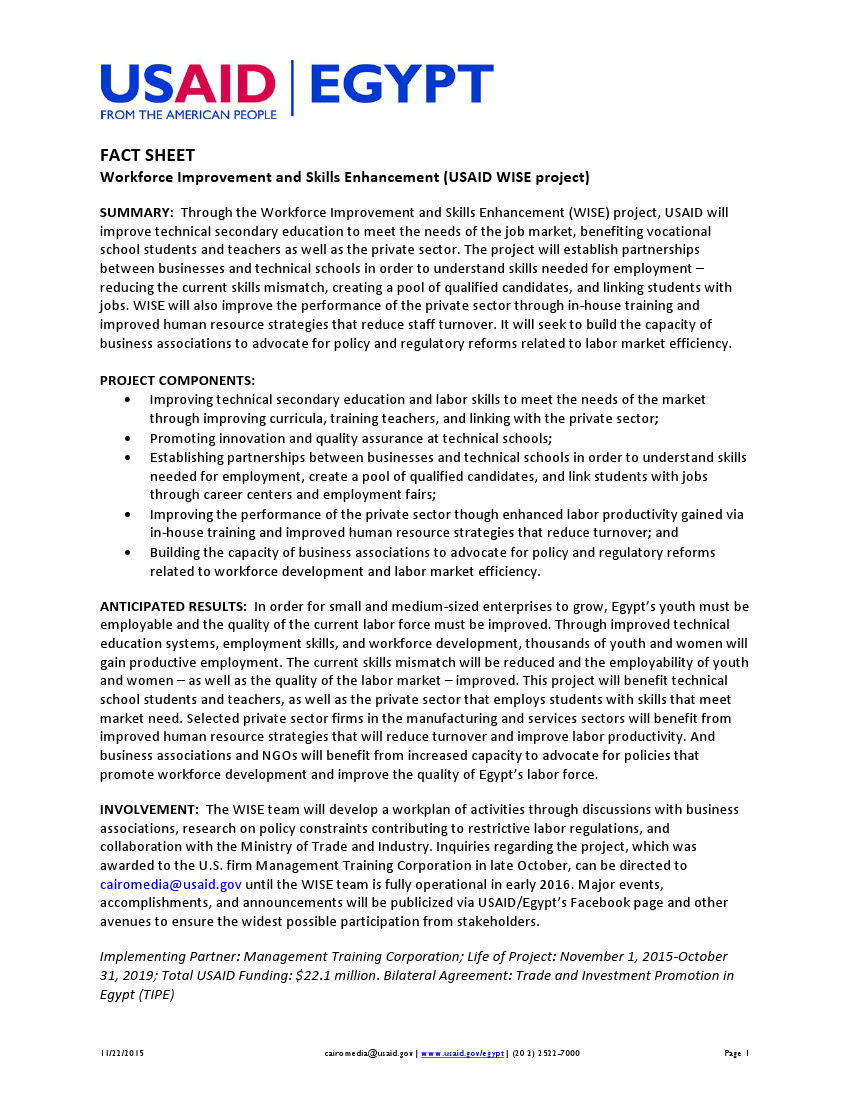Speeches Shim
SUMMARY: Through the Workforce Improvement and Skills Enhancement (WISE) project, USAID will improve technical secondary education to meet the needs of the job market, benefiting vocational school students and teachers as well as the private sector. The project will establish partnerships between businesses and technical schools in order to understand skills needed for employment – reducing the current skills mismatch, creating a pool of qualified candidates, and linking students with jobs. WISE will also improve the performance of the private sector through in-house training and improved human resource strategies that reduce staff turnover. It will seek to build the capacity of business associations to advocate for policy and regulatory reforms related to labor market efficiency.
PROJECT COMPONENTS:
- Improving technical secondary education and labor skills to meet the needs of the market through improving curricula, training teachers, and linking with the private sector;
- Promoting innovation and quality assurance at technical schools;
- Establishing partnerships between businesses and technical schools in order to understand skills needed for employment, create a pool of qualified candidates, and link students with jobs through career centers and employment fairs;
- Improving the performance of the private sector though enhanced labor productivity gained via in-house training and improved human resource strategies that reduce turnover; and
- Building the capacity of business associations to advocate for policy and regulatory reforms related to workforce development and labor market efficiency.
ANTICIPATED RESULTS: In order for small and medium-sized enterprises to grow, Egypt’s youth must be employable and the quality of the current labor force must be improved. Through improved technical education systems, employment skills, and workforce development, thousands of youth and women will gain productive employment. The current skills mismatch will be reduced and the employability of youth and women – as well as the quality of the labor market – improved. This project will benefit technical school students and teachers, as well as the private sector that employs students with skills that meet market need. Selected private sector firms in the manufacturing and services sectors will benefit from improved human resource strategies that will reduce turnover and improve labor productivity. And business associations and NGOs will benefit from increased capacity to advocate for policies that promote workforce development and improve the quality of Egypt’s labor force.
INVOLVEMENT: The WISE team will develop a workplan of activities through discussions with business associations, research on policy constraints contributing to restrictive labor regulations, and collaboration with the Ministry of Trade and Industry. Inquiries regarding the project, which was awarded to the U.S. firm Management Training Corporation in late October, can be directed to cairomedia@usaid.gov until the WISE team is fully operational in early 2016. Major events, accomplishments, and announcements will be publicized via USAID/Egypt’s Facebook page and other avenues to ensure the widest possible participation from stakeholders.
Implementing Partner: Management Training Corporation; Life of Project: November 1, 2015-October 31, 2019; Total USAID Funding: $22.1 million. Bilateral Agreement: Trade and Investment Promotion in Egypt (TIPE)
FREQUENTLY ASKED QUESTIONS
How can I learn more? Who can I contact?
Inquiries regarding the project can be directed to cairomedia@usaid.gov until the WISE team is fully operational in early 2016.
Who is the implementing partner?
The contract was awarded to U.S. firm Management Training Corporation in October 2015.
When will USAID’s WISE project get started?
The WISE project was awarded in October 2015 and expects to be fully operational in early 2016. The first task for the team is to develop a work plan of activities through: discussions with business associations, research on policy constraints contributing to restrictive labor regulations, and collaboration with the Ministry of Trade and Industry.
Is this project restricted to Upper Egypt?
No, this program will work throughout Egypt with technical schools, the private sector, and business associations.
I am a vocational school student. How can I benefit from this project?
This project will train teachers and create career centers at vocational schools, which will in turn improve your technical education and prepare you for productive employment. It will also assist in improving the quality of curricula, introducing entrepreneurship education as well as new specializations, linking the schools to the private sector, facilitating student training and employment of graduates, and improving the overall management of the technical schools.
I am a vocational school administrator. How can my school get involved in this project?
The WISE project team will consult with the Ministry of Education and Technical Education and the Ministry of Trade and Industry to determine targeted schools.
I am a business looking for skilled workers. How can I access this pool of qualified candidates?
The project will first establish partnerships between businesses and technical schools in order to understand skills needed for employment – reducing the current skills mismatch, creating a pool of qualified candidates, and linking students with jobs. These partnerships will develop into linkages between vocational school career centers and recruiters. The WISE team will reach out to firms once they are operational in early 2016. Until then, please contact cairomedia@usaid.gov for information.
My firm needs help reducing staff turnover. How can the WISE project help?
One aspect of this project is to provide in-house training to human resources teams in private sector businesses in the manufacturing and services sectors. This training will help firms to develop human resources strategies that will reduce turnover and improve labor productivity.


Comment
Make a general inquiry or suggest an improvement.